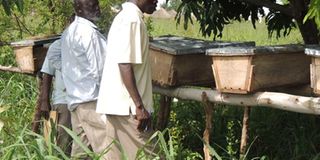Propolis: The bee product on demand

Beekeepers in Kayunga District inspect an apiary. Uganda is said to have potential to produce more than 500,000 tonnes of honey annually. FILE PHOTO
What you need to know:
- Bees are not only important for pollination but also for products such as propolis, writes Brian Ssenoga
The most commonly known product of bees is honey but it is necessarily not the most profitable of all bee products. Today in Uganda and the East African region, there is a growing demand for propolis tincture— a liquid solution from the propolis resin.
Information from The Uganda National Apiculture Development Organisantion (Tunado) indicates the demand for propolis is steadily rising as that of honey.
This situation attributed to the growing health conscious trends of the population.
“We cannot place the exact figures now but the information we get from the farmers and processors is that in addition to honey, their sales have also increased in terms of propolis. This was not the case about two years ago,” Phonah Birungi, Tunado programme manager explains.
“The major clients are pharmacies, clinics and individual persons. Propolis is one of the wonders of the beehive.”
According to Beekeeping as a Business, a 2015 publication by Malaika Honey, propolis has been used since ancient times.
The name is believed to come from Greek philosopher Aristotle (384-322 BC) who wrote the first detailed natural scientific study into the working of the honey bee.
In the ancient Greek language “pro” means—before—and “polis” means—city. Hence the meaning “before the city” or “defender of the city”.
“Bees line the walls of the beehive with resin and build a defensive wall at the entrance through which bees enter. Raw propolis is a mixture of plant extracts mixed with the bees own enzymes to create a sticky resinous substance that has antibiotic, antiseptic and antifungal properties,” reads an extract in the book.
The Egyptians used it to preserve bodies for mummification by soaking bandages in melted honey, wax and propolis.
As the bee enters the hive, it is disinfected from outside bacteria. It is a natural wonder that thousands of bees living in a highly confined space over 25 degrees Celsius and high humidity that is perfect to the growth of bacteria remain healthy. This happens to be one of the most sterile environments in the world.
“So with many naturally occurring compounds, propolis has a broad spectrum of medicinal effect that has been used by man as a medicine since ancient times. And with the increasing knowledge about its benefits, the demand definitely has to increase and it is upon farmers and processors to rise upto the occasion,” explains Robert Okodia, the director Wimrob Bees.
The fact that propolis has many different properties makes it able to work in a holistic way that is, through its ability to trigger the body’s fighting mechanisms rather than by killing or destroying specific bacteria, viruses or fungi. It is a complex attack system in nature that can be used both internally and externally.
To note
One kilogramme of raw propolis is between Shs20,000-Shs30,000. Specifically, propolis contains the polyphenols called flavonoids which are produced in plants as a form of protection. They’re commonly found in foods thought to have antioxidant properties.
Some medical reports claim eating propolis daily in small doses can help strengthen the immune system against bacteria, fungi, and viruses, including the flu. Furthermore, propolis is not affected by the various mutations of bacteria, as it works against all strains in general.




